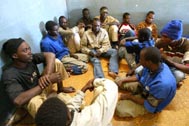Hispanic workers endure hazardous conditions, abuse post-Katrina
Illegal immigrants helping to rebuild this shattered city are working in hazardous conditions without protective gear and earning far less than their legal counterparts, a study says.

Nearly one-third of the illegal immigrants interviewed by researchers reported working with harmful substances and in dangerous conditions, while 19 percent said they were not given any protective equipment, according to the study by professors at Tulane University and the University of California at Berkeley.
Illegal immigrants also were paid significantly less, if at all, earning on average $10 (Ђ7.78) per hour, compared with $16.50 (Ђ12.84) for documented workers, the study said.
"What is fundamentally unfair is these are workers who have responded to a national priority to rebuild this city and yet whose rights are being violated," said Laurel Fletcher, director of Berkeley's International Human Rights Law Clinic and one of the study's co-authors.
Under federal labor law, illegal immigrants are afforded the same health and safety protections as documented workers. And regardless of their legal status, laborers can sue most employers under the Fair Labor Standards Act for violation of the minimum wage law and overtime regulations, according to the researchers.
The U.S. Department of Labor had no immediate comment on the report.
Before last year's hurricane, Louisiana had one of the smallest Hispanic populations in the country, 2.5 percent of residents compared with 12.5 percent nationally.
Census data indicates nearly 100,000 Hispanics moved to the Gulf Coast region following Hurricane Katrina, lured by promises of high wages and plentiful work. It is unclear precisely how many have come to New Orleans, though the study estimates one-quarter of the construction workers in New Orleans are illegal immigrants.
They are now the backbone of the reconstruction, converging at dawn on the city, waiting to be picked up for 14-hour shifts hauling debris, ripping out drywall and nailing walls. Because so many are here illegally, the study says, they are especially vulnerable to exploitation.
To make his point, Alberto Mendoza holds up his lined, calloused hands, proof of the hard and unprotected work he has been performing. "No gloves, no goggles, no nothing," said the 40-year-old illegal immigrant from Mexico City.
In his pocket, he keeps a jagged piece of paper inscribed with the word "Pam" and a cell phone number, his only lifeline to the woman who hired him, reports AP.
O.Ch.
Subscribe to Pravda.Ru Telegram channel, Facebook, RSS!





